Nokia Lumia 900 Review - Windows Phone with LTE
by Brian Klug on April 3, 2012 9:00 PM ESTBattery Life and Charging
First things first, the Lumia 900 has none of the charging issues or problem behavior that initially plagued the Lumia 800. In the course of our battery life testing, I’ve repeatedly discharged and charged the phone completely and the Lumia 900 charges up from completely empty like a champ. It seems those initial growing pains are now squarely behind Nokia.
In addition, Nokia has gone with a compact 5W charger (5V 1A) that the Lumia 900 takes full advantage of during a charge cycle - I repeatedly saw the Lumia 900 draw over 800 mA during the charge cycle in its diagnostics menu, which is awesome. One of the things I’ve seen requested a lot is also measurement of just how long devices take to charge from completely empty - I measured the Lumia at almost exactly 3 hours with repeatability, using the supplied charger. The Lumia 900 uses an internal 1830 mAh, 6.77 Whr battery which is about what you’d expect for a device which includes a 4.3" SAMOLED display and LTE.
So how does battery life fare on the Lumia 900? To find out, I turned to our regular suite of battery life tests which consist of pages loaded endlessly until the phone dies, with the display set as close to 200 nits as possible. In the case of the Lumia 900, this actually ends up being the max brightness setting (WP7 offers three settings and auto). Due to time constraints, I haven’t run the WiFi page loading test, but have run the cellular tests over both 3G WCDMA and 4G LTE.
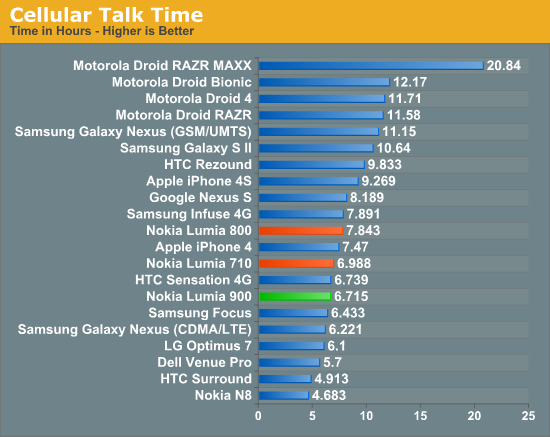
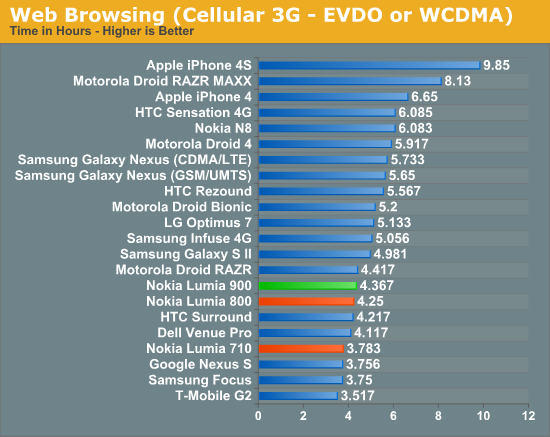
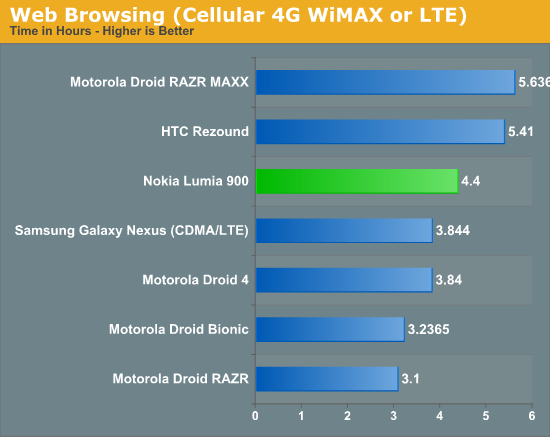
When it comes to web browsing, both the 3G WCDMA and 4G LTE results end up being pretty close at around 4.4 hours. This tells me that we’re pretty much dominated by the display’s power drain in that neighborhood. The web browsing tests tend to be pretty brutal on AMOLED devices to begin with, partly because we’re dealing with black text atop a white background. In practice I feel like the Lumia 900 does subjectively a lot better than these results really would lend you to believe. If you can believe it, we actually haven't formally published any AT&T LTE device results yet, so the Lumia 900 is our first.
In addition I’ve also run our hotspot tethering test on 3G WCDMA and 4G LTE, which consists of four tabs of our normal webpage loading suite alongside a 128 kbps MP3 internet radio stream all loaded on one wireless client.
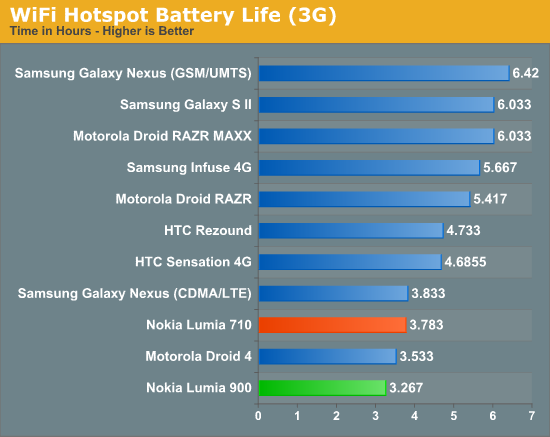
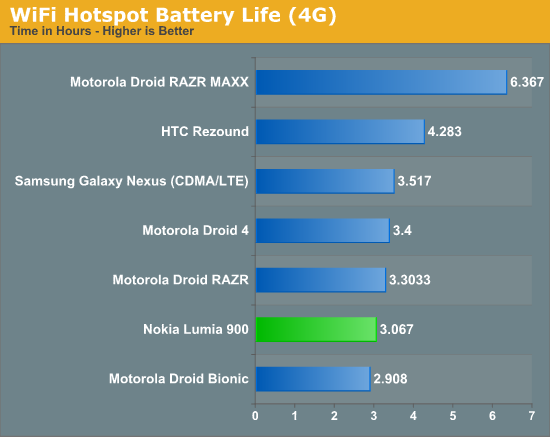
The results of the tethering test demonstrate just how taxing constant connectivity can be for the current crop of 45nm basebands, and the Lumia 900 does pay the price for having a relatively hungry one. Our testing was done in good AT&T LTE and HSPA+ coverage, and interestingly enough the results are pretty close for the two air interfaces at around 3 hours. Jumping onto LTE and running the same test incurs a half hour hit.


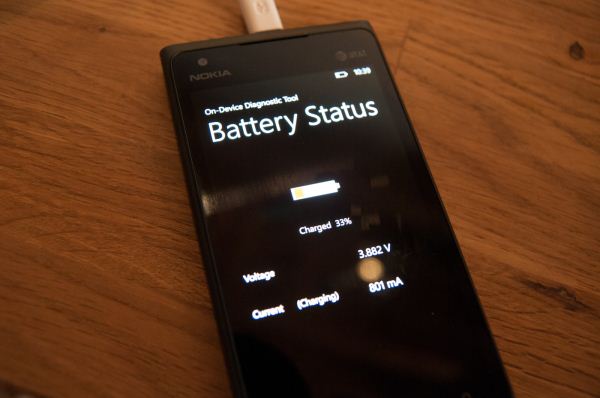








128 Comments
View All Comments
BabelHuber - Wednesday, April 4, 2012 - link
---> Can be used like a USB-stick. No iTunes/ Zune needed. Simply plug your phone into your PC and use the Explorer you like--> I can connect USB-harddiscs to my Asus TF Prime. Like in Windows, I can messs around with a file explorer there
--> File explorer: Android has a real Linux file system. You can handle files like you have always done with computers. Hence cloud-services are not mandatory.
--> Supports SD cards including full access via file explorer
--> Allows installation of apps that were not downloaded via Google Play/ market. You can install whatever you want
--> Real multitasking
--> Allows tweaking: I have e.g. installed the rSAp-functionality on my Android phone last weekend:
I have installed new system libraries, maually replaced system files etc. to get it work.
It was a lot of effort, but at least I could do it. My warranty is gone now, though.
To sum it up: Android is like a real Personal Computer. You can do whatever you want with it, there are no restrictions whatsoever.
As a downside, you can mess up your phone completely, too. But this is the price of freedom
steven75 - Wednesday, April 4, 2012 - link
Ah so all things 99% of the market doesn't need or want. Gotcha!eddman - Wednesday, April 4, 2012 - link
iphone does not support them and still sells millions. Most people don't care about those features on a phone.ol1bit - Wednesday, April 4, 2012 - link
I do, and I know lots of others who like that as well, otherwise, why have a smart phone?eddman - Wednesday, April 4, 2012 - link
I said most, not all. Obviously for users who want those features, android is the only choice.I'm just saying that the lack of those features won't necessarily impact the sales, judging from how well iphones sold and keep selling.
BabelHuber - Thursday, April 5, 2012 - link
Well, from my experience some iOS-users don't even know that functionality is missing.When I quickly use my phone as USB-stick to transmit data from one notebook to another, they even are surprised (and yes, such things don't occur often, but sometimes this comes in handy)
Or when I browse my files using an actual browser, they are surprised that I don't have to open an App first.
Some users are so locked into the Apple ecosystem that they don't even expect their smartphone to act as a small PC, even though it is one.
They act as if their phone was a fixed-function-device because of technical limitations, not because openness was omitted on purpose by the manufacturer.
Xale - Friday, April 6, 2012 - link
Humerously, those aren't even Android features, but Feature Phone (Dumbphone) features.Stuff that could be done a decade ago.
TGressus - Thursday, April 5, 2012 - link
why indeed?It seems like a more powerful tablet experience would serve folks better. Then the phone can go back to being a sleek and inexpensive afterthought.
What it's going to take to get there is a better tablet OS. MS is poised to bring it first, which I don't think many saw coming.
tipoo - Wednesday, April 4, 2012 - link
Its almost funny how close to Windows vs OSX vs Linux this has become. Android gives you by a landslide the most options, iOS has a great user experience but cages advanced users in a bit too much, WP7 is somewhere in the middle on both fronts.WP7 seems to trade off absolute speed for smoothness. Looking at the browser synthetic benchmarks its much slower than even old single core Android or iOS phones, but what reviews can't show you is how well it lets you navigate pages during that loading time.
Braumin - Wednesday, April 4, 2012 - link
Actually they don't show load times, every site on the earth focuses on javascript as the be all and end all for web browsing.